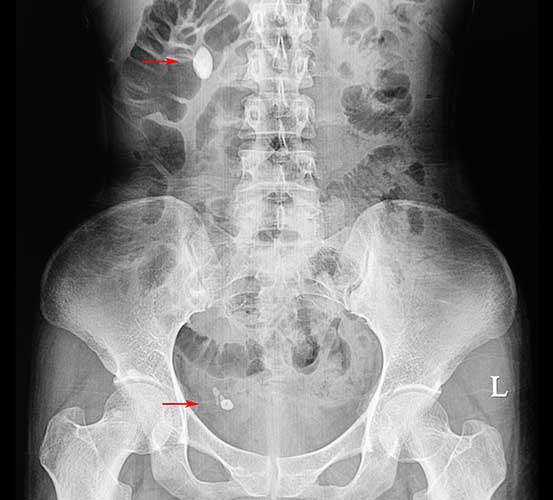
Chronic diabetes and a diet packed with added sugars could increase the risk of developing kidney stones by up to twofold.
Multiple studies, including a new one published in the Frontiers of Nutrition journal on August 4, have linked high risk of kidney stones to excess intake of added sugars in the daily diet.
The new study also lists obesity, chronic diarrhoea, dehydration, inflammatory bowel disease and gout as potential risk elevators for kidney stones.
“High glucose levels cause high blood viscosity and lead to frequent urination,” says Dr Mahesh DM, consultant, endocrinology, Aster CMI Hospital, Bengaluru. “People lose more water through urine, leading to dehydration, which is one of the major contributors of kidney stones. That is why we advise those with kidney stones to drink a lot of water.”
Dr Mahesh adds that the basic alkaline nature of urine is to prevent the formation of stones. There are usually four types of kidney stones:
- calcium oxalate
- uric acid
- struvite
- cystine.
“But due to high glucose levels, the body will start producing ketoacids that will increase acidity in the urine,” Dr Mahesh says. “Acidic urine increases the risk of kidney stones.”
Diabetes, junk food and kidney stones
After analysing epidemiological data of 28,303 adult men and women from the US National Health and Nutrition Examination Survey 2007-2018, a team of researchers from China and Sweden has now linked consumption of added sugars to high risk of kidney stone.
The study analysed the dietary pattern of the participants by conducting direct interviews and further follow-ups to ascertain that the participants with higher added sugar intake were found to have 39% greater odds of developing kidney stones over the course of the study.
The researchers have listed cookies, candies, fruit drinks, carbonated sugary beverages and cakes as abundant sources of added sugars.
“It suggests that limiting added sugar intake may help to prevent the formation of kidney stones,” lead author Dr Shan Yin, a researcher at the Affiliated Hospital of North Sichuan Medical College, Nanchong, China, said in an official release.
Dr Yin added that further research should be conducted to fully explore the link between kidney stones and added sugars.
According to an earlier study, published in BMJ Open in 2020, glycemic control and insulin resistance are the two most important factors in the formation of kidney stones.
Hyperglycemia was found to increase urinary calcium, phosphorous, uric acid and oxalate secretion that could lead to the formation of kidney stones. Increased insulin resistance also contributed to urinary acidification as it ultimately decreases the level of citrate, which is an alkalizing agent. Together, these mechanisms lead to increased risk of precipitation and subsequent formation of uric acid stones, says the study.
Are kidney stones common in people with diabetes?
People with diabetes usually have metabolic syndrome (group of disorders that include high BP, obesity, high cholesterol) that tends to create excess uric acid.
“Uric acid stones, which are usually rare in the general population, are common among people with diabetes,” says Dr Garima Aggarwal, a Bengaluru-based nephrologist and renal transplant physician. “Metabolic syndrome is associated with insulin resistance, which is known to lead to low pH and make urine acidic.”
As diabetics are more prone to infections, they are also at risk of developing struvite stones and oxalate stones due to highly acidic urine.
Signs of kidney stones
The main symptoms of kidney stones are:
- Severe pain, often unresponsive to painkillers
- Urge to urinate but unable to pass urine properly
- Burning sensation while passing urine
- Fever (if urinary infection due to the stone affects your kidney).
People with both diabetes and recurring bouts of renal stones are prone to an early onset of kidney diseases. “Chronic kidney disease is more common in diabetics and progression of renal failure will quicken,” says Dr Mahesh.
Kidney stones treatment
The risk of renal stone formation is high in people with diabetes. Normally, urine should contain very little glucose but in the case of people with diabetes, the kidney will pass excess glucose through urine. On its way to the urinary bladder, this glucose interacts with other vascular compounds and could lead to the formation of bigger stones than in the case of non-diabetic people.
Dr Garima says, “If the stone is less than 5mm in size and not located lower down the ureter (tube that carries urine from kidney to bladder), then it can be managed with medicines. However, if the stone is lower down in the ureter or is bigger than 5mm, then it could cause infection and require surgery.”
Diabetes and kidney stones diet
Once you have renal stones, you are at higher risk of developing it again. Hence, you should follow a kidney stone diet.
- Have plenty of water — at least three to four litres a day.
- Consume more fresh vegetables and fruits.
- Avoid foods high in oxalates (like chocolates, kidney beans, beetroots, spinach and potatoes) as they tend to cause more stone formation.
- Consume non-vegetarian food in moderation as animal protein makes your urine more acidic.
- Avoid junk food.
- Do not self-prescribe vitamin C and D supplements as they have been associated with more recurrence of stones.
How to prevent kidney stones if diabetic
- Keep yourself hydrated
- Maintain glucose levels under control
- Ensure timely medication as prescribed by doctor
- Maintain a healthy body weight.
Takeaways
- Diabetes increases the risk of kidney stones by up to twofold. People with diabetes lose more water through urine, leading to dehydration, which could aid in the formation of kidney stones. High glucose levels also make the urine acidic, which increases the risk of kidney stones.
- Kidney stone symptoms include severe pain, frequent urination and burning sensation during urination.
- Experts recommend lifestyle and dietary modifications along with good diabetes control to prevent recurring episodes of kidney stones.


















0 Responses
Excellent
good article